Are Vodka and Gin the Same?
Vodka or Gin: What’s the difference?
Vodka and gin are two of the most well known spirits in the world. They’re often substituted for one another in famous cocktails, and even cut from the same cloth (well, distilled similarly I should say). If they’re so alike, why not just call them one name? Let’s break it down!
Vodka
This is an odorless and neutral spirit with its origins leading all the way back to the motherland, Russia. Often called the Slavic name “Voda,” it was produced in the 14th century and has a deep and rich history around the world today. Vodka could be distilled from nearly any crop that can be fermented, whether it’s potatoes, grains, beets, rye, or barley. This alcohol by U.S. government definition should be filtered or treated “so as to be without distinctive character, aroma, taste, or color.” Now does that mean it’s a bland alcohol? Sometimes, however, a lot of vodkas have pretty unique tastes and flavor profiles aside from frozen nail polish so long as they’re stored properly. Take this as me passively telling you to yank that vodka out of your freezer right now and store it properly (college is over buddy).
Gin
Gin could be traced back to 17th century Holland where it was used as a cure-all medicine. While it’s distilled very similarly to vodka and neutral in color, it has a distinct botanical flavor. Otherwise known as “genever,” this (would be) neutral spirit is produced with the re-distillation of juniper berries and aromatics, which sing strongly in the profile of the liquor. Expect a notable pine taste when enjoying this alcohol.
Similarities and differences
Distillation
Vodka and Gin follow a similar distillation process, but the key difference is the ingredients. While vodka could be made up of nearly anything under the sun that’s edible and ferments, gin needs juniper to be classified as such. Speaking of strict classifications, they both have to be at least 40 proof to be considered their respective spirits. That doesn’t mean that one can’t be the other, right? Well..
Medicines?
I’ve mentioned the “healing” properties of gin in a few previous articles as well as above, but what about vodka? Did you ever have a parent or guardian that would give you a bit of alcohol to soothe your sore tooth, or maybe rub on a wound? I’m not talking about rubbing alcohol exclusively, but the slavic spirit itself! Vodka has a long history as a healing aid. At its barebone minimum, it’s neutral in taste and a disinfectant, meaning you could swish it around your mouth when your dentist isn’t handy. If we step back a few centuries however, we’d see vodka on the shelves of pharmacies! This was a “wonder drug” to universally cure many ailments! From poor circulation, infertility, and even the plague, vodka was a go to for many people. Is there any hard science proving its efficacy? Of course not, but that’s not to say it couldn’t help with simple health problems today.
Can a toad be a frog?
Gin could certainly be classified as flavored vodka, however vodka cannot be referred to as gin. Here in the United States, vodka has to be neutral in taste and color to be classified as such, so when juniper is added to the mash, we no longer have that pure product. This isn’t to say these can’t be used synonymously, but more so vodka being a good substitute for gin if you’re either out of the piney liquor, or desire a more muted taste.
In addition, vodka could be enjoyed straight. This spirit served neat is full bodied and paired well with bougie meals. This isn’t to say to refrain from mixing it into a great cocktail; vodka takes on the taste of nearly anything you put it with! While gin could be enjoyed neat, it’ll make its presence known when used.
The taste could vary greatly between and within these two spirits. Vodka could be infused with many different citrus flavors and carry tones of whatever their respective distiller wants to go for. Gin is similar in this regard, but it generally follows the same juniper and aromatic format. Furthermore, vodka tends to take on the taste of its cocktails; mix it with orange juice? Cool. You have hard orange juice. Cola? Sure. You have hard cola. Energy drinks? Nice. A Vodka Redbull at the ready. Gin is a bit too flavorful to have the same chameleon-like properties, and it’ll sing over many notes within your mixes as the lead, leaving most additions in the background.
Conclusion
Gin and vodka are very similar spirits but have pretty distinct differences. If you’re looking for a neutral alcohol to pair with a flavorful meal, or to take on the taste of your chosen cocktail, I’d choose vodka. If you have your palette set for a piney profile, or want a distinct aromatic drink, go for gin! I’m an advocate for substituting one for the other as well. These are both great liquors. Experiment and enjoy!

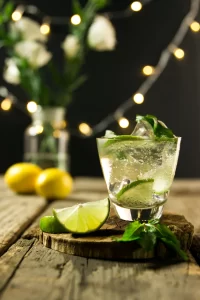
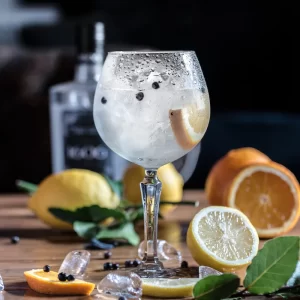
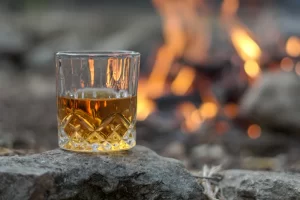
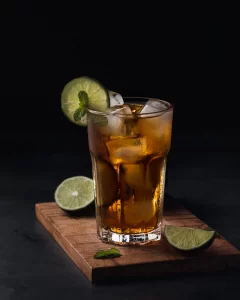
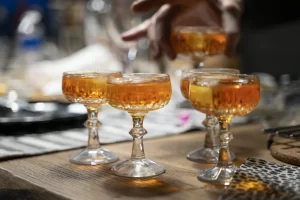




Understanding the Differences Between Proof and ABV - Distillery Nearby
February 16, 2023[…] of wine next to it with a 7% would be a weak wine. Then liquor could be anywhere on the scale. When comparing gin and vodka, gin has relatively low ABV volumes, around 30-50%. While vodka could be as high as 95% […]